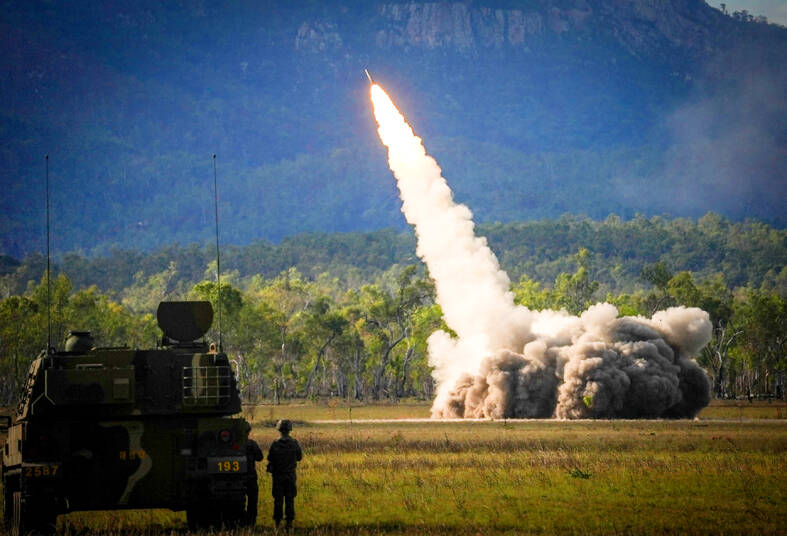Delivery of F-16 jets and attending equipment would be delayed, while the second batch of the M142 High Mobility Artillery Rocket System (HIMARS) is ahead of schedule and would be delivered by next year, the Ministry of National Defense said yesterday.
The ministry’s budget for this year, delivered to the Legislative Yuan yesterday, and the special budget for the government’s procurement of new fighter jets showed that the remaining 15 purchases are on schedule.
Programs on schedule include the shore-mounted Harpoon Coastal Defense System, the purchases of M1A2T Abrams Main Battle Tanks (MBT) and 74 tankers, the ministry said.

Photo: AFP
The Harpoon missile system, consisting of 32 vehicle launcher systems and 128 missiles, was part of a NT$71 billion (US$2.2 billion) deal approved in 2020. The full delivery is scheduled for completion in 2028.
Thirty-eight of the 108 M1A2 tanks were delivered in December last year, with two additional shipments of 42 tanks each expected to arrive this year and next.
The ministry attributed the fighter jet delays to two issues, the first being the delayed delivery of the AGM-154 Joint Stand-off Weapon missiles — which the air force’s F-16V jets are equipped with from 2023 to next year — due to US production capabilities and trial times.
Second, the newly built F-16 block 70 jets have just rolled off Lockheed-Martin’s production lines and are undergoing ground tests, with the first jets expected to be flown back to Taiwan next year.
Minister of National Defense Wellington Koo (顧立雄) on Thursday last week said that Taiwan intends to send deputy minister-level officials, accompanied by the air force’s deputy chief of staff, to attend the ceremonial event in the US marking the jet’s completion.
The ministry purchased 29 HIMARS and 84 MGM-140 Army Tactical Missile System (ATACMS) last year, with the first batch of 11 HIMARS and 64 ATACMS arriving that same year.
The remaining 18 HIMARS are expected to be delivered next year, ahead of the originally scheduled 2027, the ministry said.

Taiwanese can file complaints with the Tourism Administration to report travel agencies if their activities caused termination of a person’s citizenship, Mainland Affairs Council Minister Chiu Chui-cheng (邱垂正) said yesterday, after a podcaster highlighted a case in which a person’s citizenship was canceled for receiving a single-use Chinese passport to enter Russia. The council is aware of incidents in which people who signed up through Chinese travel agencies for tours of Russia were told they could obtain Russian visas and fast-track border clearance, Chiu told reporters on the sidelines of an event in Taipei. However, the travel agencies actually applied

Japanese footwear brand Onitsuka Tiger today issued a public apology and said it has suspended an employee amid allegations that the staff member discriminated against a Vietnamese customer at its Taipei 101 store. Posting on the social media platform Threads yesterday, a user said that an employee at the store said that “those shoes are very expensive” when her friend, who is a migrant worker from Vietnam, asked for assistance. The employee then ignored her until she asked again, to which she replied: "We don't have a size 37." The post had amassed nearly 26,000 likes and 916 comments as of this

New measures aimed at making Taiwan more attractive to foreign professionals came into effect this month, the National Development Council said yesterday. Among the changes, international students at Taiwanese universities would be able to work in Taiwan without a work permit in the two years after they graduate, explainer materials provided by the council said. In addition, foreign nationals who graduated from one of the world’s top 200 universities within the past five years can also apply for a two-year open work permit. Previously, those graduates would have needed to apply for a work permit using point-based criteria or have a Taiwanese company

The Shilin District Prosecutors’ Office yesterday indicted two Taiwanese and issued a wanted notice for Pete Liu (劉作虎), founder of Shenzhen-based smartphone manufacturer OnePlus Technology Co (萬普拉斯科技), for allegedly contravening the Act Governing Relations Between the People of the Taiwan Area and the Mainland Area (臺灣地區與大陸地區人民關係條例) by poaching 70 engineers in Taiwan. Liu allegedly traveled to Taiwan at the end of 2014 and met with a Taiwanese man surnamed Lin (林) to discuss establishing a mobile software research and development (R&D) team in Taiwan, prosecutors said. Without approval from the government, Lin, following Liu’s instructions, recruited more than 70 software